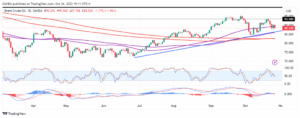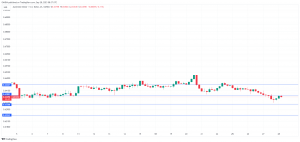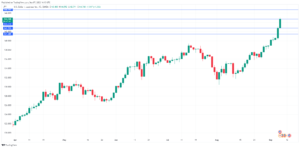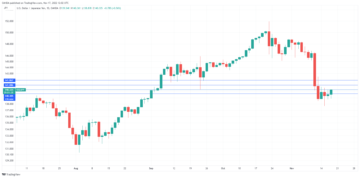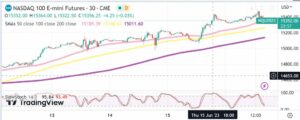The event we’ve all been waiting for
Jackson Hole has been heavily discussed since the Fed’s supposed “dovish pivot” last month when it adopted a more data-dependent stance. While policymakers have pushed back against the idea of a pivot, markets have continued to price in a slower path of tightening.
Chair Jerome Powell could use his platform next week to join the chorus of policymakers highlighting the need for ongoing aggressive tightening, continuing the push back against the market narrative. But will he do that? The CPI data for July may allow for a softer approach, although it could be argued to be counterproductive given how high inflation still is and how much work there remains to do.
As ever with these events, it won’t take much to excite investors. Any hint at all that the central bank could be tempted to take its foot off the break, that inflation has peaked and will fall back towards target could be enough to fuel more optimism in the markets. The question is what happens if there is no pivot? Will investors be as open to a hawkish Powell as they will a dovish one?
Pressure ramping up on the SARB?
CBRT cuts rates as inflation nears 80%
US
The main event of the week will be the Jackson Hole Symposium. The annual global central banking conference will feature Fed Chair Powell’s speech which may give some insight into how aggressive the Fed will be with tightening in September. Many traders will remember Powell’s 2021 address which clearly showed him tripling down on his view that inflation was transitory.
Powell will reiterate the message that the economy still has forward momentum and that they are nearing the end of tightening. He may also try to drive the point that after they are done tightening, the Fed will keep rates steady for a while until inflation has clearly returned closer to target.
A wrath of economic data will be released, with the two big ones being the flash PMI readings and the second look at Q2 GDP. Friday will be busy with the Fed’s preferred inflation gauge, and personal income data for July that is expected to remain steady while spending slows.
Election season continues with US primary elections in Florida and New York.
EU
Economic data in focus next week, with surveys among the highlights as flash PMIs, GfK and Ifo are released. Europe is likely heading for recession and the surveys will tell us how fearful businesses in the bloc are ahead of what could be a troubling winter on the energy front. On that, energy will be a key focus as it will throughout the winter.
The ECB meeting accounts will also be in focus as traders fully price in a 50 basis point hike next month. Appearances from policymakers will also be closely followed, as ever.
UK
Flash PMIs are the only releases of note next week while any commentary from BoE policymakers will also be closely monitored. Markets are currently pricing a strong chance of a 50 basis point rate hike next month although there is now an outside chance of 75.
Russia
Just industrial production data next week as traders weigh up how low rates are going to go. They’ve had little impact on the currency so far which remains more than 20% higher since the invasion.
South Africa
The SARB is in the midst of an aggressive tightening cycle and inflation data next week may shed some light on how much more is needed. The CPI number is expected to rise from 7.4% to 7.8%, well above its target range of 3-6%, while the core reading is expected to tick higher to 4.5% from 4.4%. Meanwhile, the unemployment rate is expected to rise from 34.5% to 35.7%.
Turkey
When inflation is running close to 80%, a bad policy move from the CBRT would ordinarily have been not raising interest rates, and aggressively at that. Naturally, that wasn’t enough for it even under these extreme economic conditions, so they instead cut rates by 100 basis points to 13% at their August meeting. In doing so, they caught forecasters everywhere off guard, despite none expecting them to do anything sensible in the first place. It takes something special for the CBRT to underperform even the lowest of expectations.
Switzerland
No data or scheduled appearances next week. We can never discount the possibility of a surprise rate hike given the SNB’s history of policy shocks.
China
On August 15, China’s central bank cut the one-year medium-term lending facility (MLF) and reverse repo rates by 10 basis points to 2.75% and 2.00%, respectively. This should lead to a reduction in the 1 and 5-year loan prime rates early next week.
China’s second-quarter GDP recorded positive growth of 0.4%, but the high cost of its zero-Covid policy and real estate bad debt may continue to limit China’s economic growth.
India
No major data or events next week.
Australia & New Zealand
The Australian and New Zealand dollars fell following the recent release of disappointing Chinese economic data for July. Australia and New Zealand’s largest export market is China, so the weak performance of Chinese economic data may be reflected in the trade data. With inflationary pressures, the RBA may continue its hawkish pace of rate hikes, with the market widely expecting a 50 basis point hike to 2.35% at the September rate meeting, on top of the current rate of 1.85%. The short-term risks are the Fed, the recent fall in commodity prices and the weak Chinese economy. PMIs in focus next week.
On August 17, the RBNZ met market expectations to raise interest rates by 50 basis points to 3.00%, the fourth consecutive rate hike this round. Next up is retail sales on Wednesday.
Japan
The Federal Reserve and the Bank of Japan’s monetary policy divergence continue to support the dollar’s strength against the yen. Events at Jackson Hole could further exacerbate these pressures or perhaps even alleviate them depending on how much the Chairman pushes back against the “dovish pivot” narrative.
BOJ Governor, Haruhiko Kuroda has previously said there is no consideration at all for a rate hike and no plans to extend the upper range of the yield curve control (YCC) of 0.25%.
Singapore
CPI and manufacturing data are in focus next week.
Economic Calendar
Saturday, Aug. 20
Economic Events
Some UK trains are expected to be cancelled amid strikes by the National Union of Rail, Maritime and Transport Workers
Italian politicians attend the annual Rimini meeting
Sunday, Aug. 21
Economic Events
Singapore PM Lee Hsien Loong gives a National Day Rally speech
German Chancellor Scholz due to speak
Port workers at Felixstowe in the UK begin an eight-day strike
Monday, Aug. 22
Economic Data/Events
China loan prime rates
Taiwan unemployment, export orders
UK Foreign Secretary Truss and former Chancellor Sunak hold hustings in Birmingham
German Chancellor Scholz to meet PM Trudeau in Canada
Austrian Chancellor Nehammer speaks about “The New Europe” at the Alpbach Forum
Tuesday, Aug. 23
Economic Data/Events
US new home sales, Flash PMIs
Australia Flash PMIs
Eurozone Flash PMIs, consumer confidence
Germany Flash PMIs
Japan Prelim PMIs, department store sales
Mexico international reserves
Singapore CPI
South Africa unemployment
Thailand Bloomberg economic survey
UK Flash PMIs
Minneapolis Fed President Kashkari speaks at Wharton Minnesota Alumni Club
ECB’s Panetta speaks at the Annual Congress of the European Economic Association at Bocconi University in Milan
German Finance Minister Lindner speaks in Switzerland
US primary elections in Florida and New York
Wednesday, Aug. 24
Economic Data/Events
US durable goods, MBA mortgage applications, pending home sales
Japan machine tool orders
Mexico bi-weekly CPI
Russia industrial production
South Africa CPI
Thailand trade
EIA crude oil inventory report
Riksbank Deputy Governor Floden speaks
French President Emmanuel Macron has his first cabinet meeting after the summer break
Italian caretaker Prime Minister Mario Draghi attends Rimini meeting
Thursday, Aug. 25
Economic Data/Events
Kansas City Fed hosts its annual economic policy symposium in Jackson Hole, Wyoming
US GDP, initial jobless claims
Germany GDP, IFO business climate
Japan PPI
Mexico GDP
New Zealand retail sales
ECB publishes an account of its July policy meeting
Bank of Japan board member Nakamura speaks in Fukuoka, Japan
Bank of Finland’s Valimaki speaks about the European economy and monetary policy
Friday, Aug. 26
Economic Data/Events
Fed Chair Powell speaks at Jackson Hole
US consumer income, wholesale inventories, University of Michigan consumer sentiment
France consumer confidence
Italy consumer confidence
Japan Tokyo CPI
Mexico trade
New Zealand consumer confidence
Singapore industrial production
Thailand forward contracts, foreign reserves, manufacturing index, capacity utilization
UK energy regulator Ofgem announces new energy price cap for households
Sovereign Rating Updates
Austria (S&P)
Denmark (S&P)
Belgium (Moody’s)
Portugal (DBRS)
This article is for general information purposes only. It is not investment advice or a solution to buy or sell securities. Opinions are the authors; not necessarily that of OANDA Corporation or any of its affiliates, subsidiaries, officers or directors. Leveraged trading is high risk and not suitable for all. You could lose all of your deposited funds.
- Australia
- Bitcoin
- blockchain
- blockchain compliance
- blockchain conference
- BoE
- CBRT
- China
- coinbase
- coingenius
- Consensus
- crypto conference
- crypto mining
- cryptocurrency
- decentralized
- DeFi
- Digital Assets
- ethereum
- EU
- Fed
- GAS
- india
- jackson hole
- Japan
- machine learning
- MarketPulse
- New Zealand
- Newsfeed
- non fungible token
- PBOC
- plato
- plato ai
- Plato Data Intelligence
- Platoblockchain
- PlatoData
- platogaming
- Polygon
- proof of stake
- RBA
- RBNZ
- Russia
- sarb
- Singapore
- SNB
- South Africa
- switzerland
- Turkey
- Uk
- us
- W3
- Week ahead
- zephyrnet



